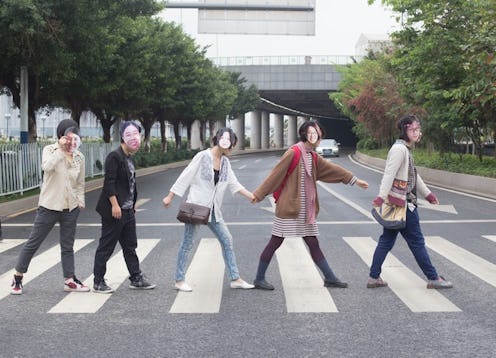News
How Activists In China Are Fighting For Feminism

When the police came to search Li Tingting’s small apartment in Beijing last March, there wasn't much she could do — so she played ukulele while her girlfriend sang along. Later that day, she was arrested for planning to give out stickers protesting sexual harassment on public transportation. Following her arrest, Li was detained for 37 days.
Seven months after being released, the five feminist activists are still under probation and are restricted from traveling.
Li, a 26-year-old college graduate, could be mistaken for any average, Chinese twenty-something. She's seemingly irreverent about most topics, from the meaning of marriage to her encounters with the police. At the time of her arrest, she was living with her girlfriend, who was working on her grad school dissertation. (Unfortunately, that work got interrupted — the girlfriend complained that her laptop was confiscated by the police.)
"The government doesn't believe women's issues are a priority. We want to push through women's rights issues," Li tells Bustle. "It's not a fundamental difference, but the government sees us as as troublemakers, but we still have to do what we have to do."
As the face of China's millennial, feminist movement, Li is anything but average. Even though she was warned by the police not to speak to journalists after her release, the statements she posted online were frequently picked up by a variety of media outlets, both Chinese and Western, mainstream and niche, including The Washington Post and The New York Times . In the past six months, Hilary Clinton herself has already Tweeted twice about Li and the four other women who were detained in March.
Li and her fellow activists have attracted global attention for refusing to be silenced in a nation where street protests are not allowed, and where several lawyers were detained earlier this year in a new wave of crackdowns on civil rights organizations. Li uses protests and social media to initiate conversations about gender issues such as sexual harassment, domestic violence, maternity leave, LGBT rights, as well as equal employment opportunity and higher education.
Her courage and motivation for activism are fueled by the injustice she felt throughout her childhood. Li moved from suburb to suburb growing up when she eventually moved to the city, she experienced discrimination because of where she came from. She says she remembers her father hitting her mother when small things set off his short temper. In junior high, she noticed she was attracted to girls.
When Li entered college, she read everything in her school's library about gender and sex, from The Second Sex by Simone de Beauvoir to Subculture of Homosexuality by Li Yinhe, China’s most celebrated scholar on gender. Simultaneously, she started to volunteer at an international non-profit organization, Marie Stopes, to promote safe sex on campus.
In 2012, Li Tingting and her friends debuted as “feminist actionists” by putting on white bridal dresses smeared with red paint to protest domestic violence while marching on downtown Beijing. It was the beginning of a series of mini protests that involved a few people wearing provocative costumes on the street, and lots of social media posts protesting gender inequality at school, work, and home.
“They were pushing back from status quo in some way,” says Eric Fish, who interviewed Li for his book, China’s Millenials: The Want Generation . “I thought she has a really cool story and she was very interesting because she didn’t oppose the government in any way. Her little demonstrations, or her performance art, as she called it, got a lot of attention.”
The young feminists have achieved more than attention. By following up their protests with petition letters, they have also made concrete social change. For example, three years after “Occupy The Men’s Room,” a protest where women took over a few men’s rooms in Beijing and Guangzhou, several cities in China have passed regulations requiring more spots for women in public restrooms.
Awareness of their actions is also spreading globally. In September, a photo show in New York City documented the millennial activists’ protests from 2012 to 2015, curated by Xintong Liu.
But despite the media coverage and legislative progress these feminist activists are making, the police are still closely watching them. Months after being released, Li says she remains scarred by her police detention and lengthy interrogations. But it hasn't stopped her from continuing to create high-profile feminist actions: A few days after the Supreme Court legalized gay marriage in the U.S., Li held a high profile unofficial wedding ceremony with her girlfriend in Beijing.
“The night before we got married, I was still worried if the police were going to barge in and take me away again,” Li said. She hopes that, through her activism, gay marriage may be legalized in China in the foreseeable future.
“Maybe in 30 years,” says the 26-year-old, “hopefully.”
Images: Courtesy of Xintong Liu